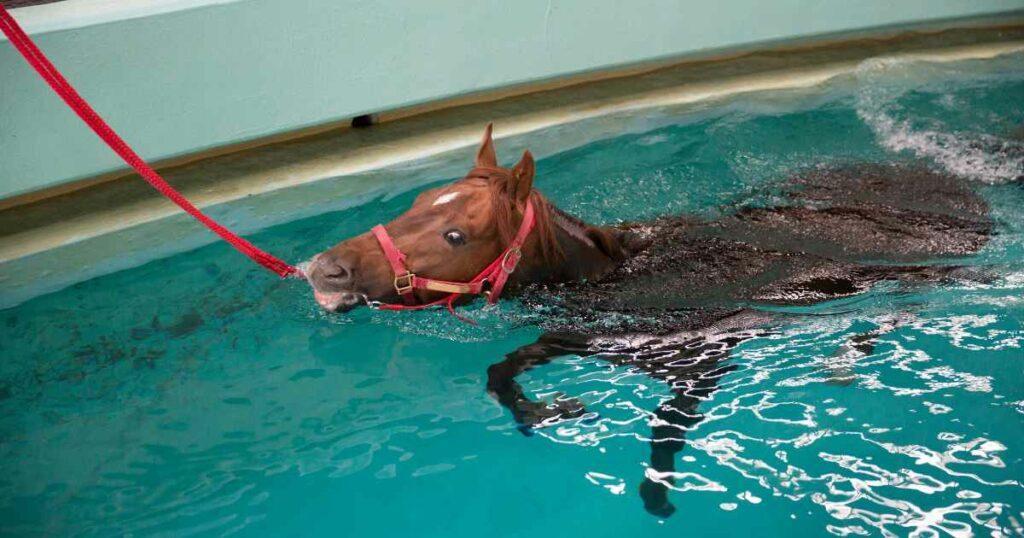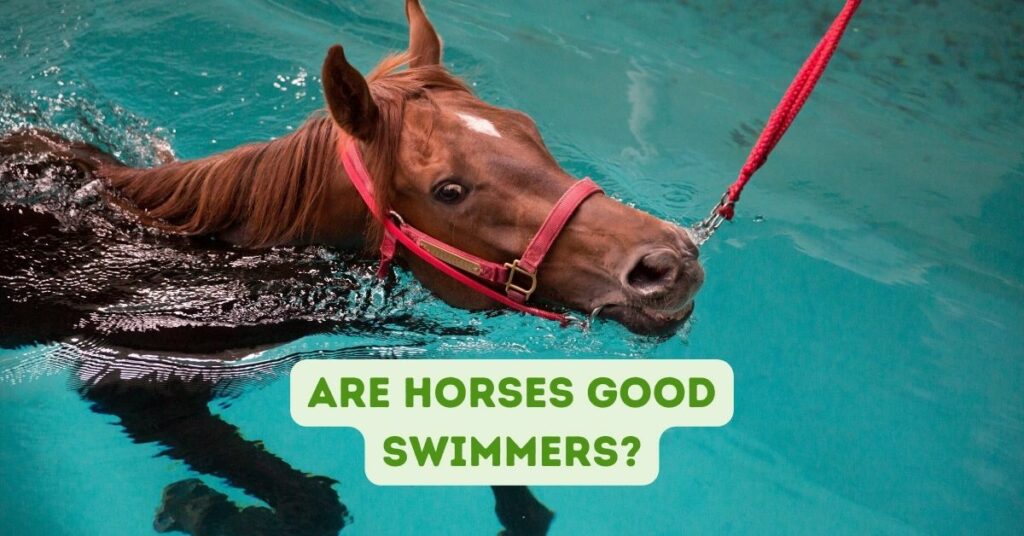As an Amazon Associate we earn from qualifying purchases.
Welcome to our comprehensive guide on the swimming capabilities of horses. In this article, we delve deep into the topic to shed light on are horses good swimmers or not. By examining their anatomy, behavior, and historical accounts, we aim to provide you with valuable insights that will help you understand the true aquatic abilities of these majestic creatures.
The Anatomy of Equine Swimmers
To determine whether horses are good swimmers, we must first explore their anatomical adaptations. While horses are not natural-born swimmers like dolphins or seals, they do possess certain physical attributes that enable them to navigate through water.
Powerful Musculature
Horses have strong, well-developed muscles that allow them to propel themselves forward with considerable force. These muscles, particularly in their hindquarters, provide the necessary power to drive their movements while swimming.
Streamlined Body Shape
Another advantage horses have in the water is their streamlined body shape. Their long, slender bodies and tapered heads minimize resistance against the water, making it easier for them to glide through aquatic environments.
Natural Buoyancy
Contrary to popular belief, horses are not buoyant creatures. Due to their dense bone structure, they tend to sink rather than float. However, their powerful swimming movements compensate for this lack of buoyancy, enabling them to stay afloat and move efficiently in the water.
Historical Accounts of Equine Swimmers
Throughout history, there have been numerous accounts of horses displaying their swimming abilities in various circumstances. From crossing rivers during military campaigns to participating in water-based sports, these anecdotes highlight the innate swimming potential of horses.
Military Uses
Horses have often been required to traverse bodies of water during military operations. They have been known to swim across rivers and even engage in tactical maneuvers while in the water. These instances demonstrate the adaptability and swimming prowess of these remarkable animals.
Competitive Swimming
In some parts of the world, horse swimming competitions have gained popularity. These events provide a platform for showcasing the swimming abilities of different horse breeds. Participants engage in races and obstacle courses, allowing spectators to witness the impressive skills exhibited by these equine athletes.
Factors Influencing Equine Swimming Ability
While horses possess certain natural abilities that aid them in swimming, it is essential to consider various factors that can influence their overall swimming proficiency.
Breed Variations
Different horse breeds exhibit varying levels of aquatic aptitude. Some breeds, such as the American Quarter Horse, are renowned for their agility in the water, while others may not excel in the same manner. Breed-specific characteristics can significantly impact the swimming abilities of horses.
Individual Conditioning and Training
As with any physical activity, the conditioning and training of individual horses play a crucial role in their swimming capabilities. Horses that receive regular exercise and swim-specific training tend to perform better in the water, developing strength and technique that enhances their swimming prowess.
Water Conditions
The condition of the water body in which horses swim can also affect their swimming abilities. Factors such as water temperature, currents, and wave intensity can influence the ease with which horses navigate through the water. Familiarity with specific water conditions can further enhance their performance.
SEE ALSO : Understanding Horseback Riding Weight Limits
Do Horses Like To Swim?
Horses find great joy in swimming, as it offers them a chance to exercise and cool off on hot days. Many horses enjoy splashing around in the water, and swimming can even help strengthen their muscles and improve their overall health. Additionally, swimming is a great way to bond with your horse, as it can help build trust and understanding between the two of you.
How Fast Can A Horse Swim?
Depending on the breed, a horse can swim at a moderate speed. Most horses swim at an average speed of around 4mph, however some breeds are known to swim faster, sometimes at speeds of up to 8mph. Generally speaking, a horse will swim slower than it can trot or gallop, and thus it is not recommended to swim a horse too far or for too long.
How To Teach A Horse To Swim
Teaching a horse to swim can be an enjoyable and rewarding experience for both horse and owner. Here are some tips to get your horse swimming in no time:
Start With Shallow Water
Before attempting to swim in deeper waters, introduce your horse to shallow waters. Allow them to explore the shallow area and get comfortable with the sensation of being submerged.
Provide Support
Initially, have a person on either side of the horse to provide support and reassurance. This will help the horse to feel secure and less fearful of the water.
Encourage Swimming
Once the horse is comfortable in the shallow water, encourage them to swim by clapping or calling their name. Praise the horse for any effort they make to swim and reward them with treats or verbal praise.
Increase The Depth
Once the horse is comfortable in shallow water, gradually increase the depth of the water. Make sure the horse remains comfortable and only increase the depth as the horse is comfortable.
Monitor Progress
Monitor the horse’s progress and make sure they remain safe while they learn to swim. If the horse begins to show signs of distress, stop and allow them to rest.
6 Amazing Benefits Of Swimming For Horses

Swimming can be a great form of exercise for horses, and it offers many health benefits that can help improve their overall health and wellbeing. From improved circulation and cardiovascular health to increased coordination and balance, swimming can help horses stay in top condition. Below we’ll explore six amazing health benefits of swimming for horses, so keep reading to learn more!
Improves Overall Fitness Level
Swimming can be a great form of exercise for horses and can help to improve their overall fitness level. It can also help to improve their overall health by strengthening their muscles and increasing their flexibility.
Form Of Low Impact Exercise
Swimming can be a great form of exercise for horses of all ages, but especially for those with injuries or ailments. It is a low-impact form of exercise that can help improve strength and range of motion without putting too much strain on the joints or muscles. Swimming also helps reduce inflammation and can help rehabilitate horses with joint problems.
Helps Relax Horses
Swimming can be an excellent way to help horses de-stress after a day of strenuous exertion. The calming effect of the deep breathing and the gentle, rhythmic movements of the water can help relax the horse, improving overall wellbeing. Not only does swimming help reduce stress levels, but it can also provide an enjoyable recreational activity for your horse to take part in.
Improves Horse’s Cardiovascular Health
Swimming is a great way to improve the health of your horse. It increases their circulation, strengthens their cardiovascular system, and builds up their core muscles. Swimming helps to increase oxygen flow throughout the body, which can help to reduce soreness and improve overall joint and muscle health. Regular swim sessions can also help to improve your horse’s overall fitness and agility, and can help them to stay in shape.
Cools Down Horses
Swimming can be an effective way to cool down a horse on a hot day. The cooling effect of the water helps to reduce their body temperature, providing a much-needed respite from the heat. It’s a great way to give your horse a break from the heat while providing them with a fun and beneficial activity.
Improves Horses Balance & Coordination
Swimming can help to build a horse’s sense of coordination and balance, as it requires them to coordinate their movements in order to remain afloat. By learning to move their limbs in unison, a horse can develop increased control and stability, which can help to improve their overall performance on land. Swimming can also help to strengthen the horse’s muscles, providing them with greater mobility and flexibility.
For more information on how to improve your horses balance & coordination follow this link.
Safety Considerations When Taking Your Horse Swimming
Swimming with your horse can be a fun and rewarding experience, but it’s important to consider the safety of both you and your horse. Here are some safety considerations to keep in mind when taking your horse swimming:
1. Familiarize Yourself with the Water: Before you take your horse out for a swim, it’s important to familiarize yourself with the water. Look for any potential hazards such as debris, rocks, or branches that could injure your horse. Check the depth and temperature of the water to make sure it’s suitable for your horse.
2. Use the Right Gear: Make sure you have the right equipment for swimming with your horse. This includes a halter, bridle, and lead rope. It’s also a good idea to use a life jacket for your horse, as this will provide extra buoyancy and help keep your horse afloat.
3. Monitor Your Horse: It’s important to keep an eye on your horse while it’s swimming. Make sure your horse doesn’t get too close to the edges of the pool or lake and that it’s not struggling or getting too tired.
4. Avoid Overexertion: Swimming can be a great way to exercise your horse, but it’s important to avoid over-exerting them. Make sure to take breaks and watch for any signs of fatigue.
Are Horses Good Swimmers – Final Thoughts
In conclusion, while horses may not be considered natural-born swimmers, they do possess remarkable adaptations that allow them to excel in aquatic environments. Their powerful musculature, streamlined body shape, and historical accounts of swimming prowess are testaments to their swimming abilities.
It is important to recognize that individual variations exist among horse breeds and that conditioning, training, and water conditions play significant roles in determining their swimming proficiency. By understanding and appreciating these factors, we gain a deeper insight into the aquatic capabilities of horses.
Amazon and the Amazon logo are trademarks of Amazon.com, Inc, or its affiliates.

Hey there, I’m Jasmine! I’m a total horse fanatic and have been working with these amazing animals for as long as I can remember. I’m passionate about sharing my love for horses with others and helping them learn more about these majestic creatures. As a professional horse trainer and riding instructor, I’ve developed a deep understanding of equine science and am committed to the welfare of horses. That’s why I founded OwnTheHorse.com, a blog where I share my knowledge and insights with fellow horse enthusiasts. I love connecting with my readers and building a friendly community of horse lovers. Whether you’re a seasoned equestrian or just starting out, I’m here to help and inspire you. Above all, I’m a friendly and compassionate person who truly cares about the well-being of horses and their human companions.

